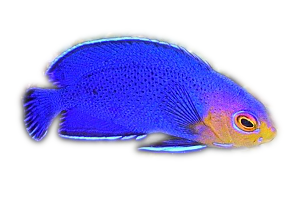
By Bob Goemans

Not Reef Tank Suitable
Likely Fish-Only Tank Suitable
Range: Indo-West Pacific Ocean: Red Sea and East Africa to New Guinea, north to Southern Japan, and south to Lord Howe Island.
Size: 6 inches (15 cm)
Natural Environment: Inhabits seagrass beds in lagoons and mangrove channels and usually found at depths between 10 – 85 feet (3 – 25 m) where it feeds on benthic invertebrates.
General Husbandry: Occasionally seen in the trade, with males green with dark lines radiating from the eyes and with several spots at the base of the tail. Females are bright green with a dark stripe along the side of the body.
Best maintained in fish-only aquariums having a fine substrate (0.5 – 2 mm) of at least 4 inches (10 cm) in depth for sleeping in at night or hiding in when frightened. It also should contain large quantities of live rock/rubble to search for prey, e.g., small crustaceans/tiny snails/copepods/zooplankton.
Those in this genus will rearrange bottom dwelling corals and rocks/rubble in its search for tasty bottom dwelling invertebrates, as it will eat snails, tubeworms, sea stars, cucumbers, urchins, crabs, and shrimp, and also quickly burrow into the sand if frightened or for sleeping at night. This diving into the sand bed will cause clouds of sand particles to be dispensed into the water, and would cause various corals harm, therefore, those in this genus are not recommended for reef aquariums.
As to diet, requires a meaty diet consisting of finely chopped clam, mussel, fish, and shrimp flesh, and/or other meaty type marine frozen foods and fed two to three times per day.
If appearing to not be getting sufficient food, try some live foods, such as black worms (Lumbriculus variegatus) or adult fortified brine shrimp.
Taxonomy:
Order: Perciformes
Suborder: Labroidei
Family: Labridae
Genus: Novaculichthys
FYI: Upon first entering the aquarium may stay buried for days. Simply await its decision when to emerge. Once established, it will go to sleep under the sand and arise the next morning at almost the exact same time every day!
One per tank and becomes quite aggressive.
Can jump out of uncovered aquariums.
Experience Level: Intermediate
Temperament: Semi-aggressive
Diet: Carnivore
Coral Safe: Yes
Fish Safe: Yes
Invertebrate Safe: With caution
Acclimation Time: 30 minutes+
Aquarium Environment: Fish-only aquarium
Tankmates: Larger, active and moderately aggressive
Minimum Tank Size: 75 gallons
Temperature Range: 74 - 82°F (23 - 27°C)
Specific Gravity: 1.020 - 1.026
pH: 8.0 - 8.5
